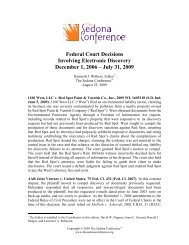Chambers Handbook for Judges - Federal Judicial Center
Chambers Handbook for Judges - Federal Judicial Center
Chambers Handbook for Judges - Federal Judicial Center
Create successful ePaper yourself
Turn your PDF publications into a flip-book with our unique Google optimized e-Paper software.
canons should be followed in resolving ethical problems. Keep in mind,<br />
however, that the canons do not lessen more stringent standards established<br />
by law, court order, or the judge <strong>for</strong> whom the law clerk works.<br />
The Committee on the Codes of Conduct has published <strong>for</strong>mal advisory<br />
opinions on issues frequently raised or issues of broad application.<br />
These opinions can be found in the Guide to Judiciary Policies and<br />
Procedures, Vol. II, Chapter IV. Further guidance in interpreting the Code<br />
may be sought from the Committee on the Codes of Conduct.<br />
C. Committee on the Codes of Conduct<br />
The <strong>Judicial</strong> Conference established a Committee on the Codes of Conduct:<br />
Persons covered by one of the codes of conduct adopted by the<br />
Conference may telephone or write the committee, through its chairperson,<br />
with questions about the applicability of the particular code to<br />
a contemplated action. Be<strong>for</strong>e contacting the committee, a law clerk<br />
should consult with the judge <strong>for</strong> whom the clerk works—the<br />
committee’s guidance is only advisory and a final decision in any ethical<br />
situation is that of the staff member, in consultation with the judge.<br />
The Committee on the Codes of Conduct should not be confused<br />
with another Conference committee, the Committee on Financial Disclosure,<br />
which was previously called the <strong>Judicial</strong> Ethics Committee.<br />
This committee receives financial disclosure reports (generally referred<br />
to by their <strong>for</strong>m number, AO-10) from federal judges, magistrate judges,<br />
and judicial employees compensated in excess of the salary <strong>for</strong> Grade<br />
16 of the General Schedule. There<strong>for</strong>e, law clerks and secretaries are<br />
not required to complete this <strong>for</strong>m.<br />
D. Nepotism and Favoritism<br />
The Code of Conduct <strong>for</strong> United States <strong>Judges</strong>, Canon 3B(4), states:<br />
A judge should not make unnecessary appointments and should exercise<br />
that power only on the basis of merit, avoiding nepotism and<br />
favoritism. A judge should not approve compensation of appointees<br />
beyond the fair value of services rendered.<br />
10 <strong>Chambers</strong> <strong>Handbook</strong> <strong>for</strong> <strong>Judges</strong>’ Law Clerks and Secretaries

















